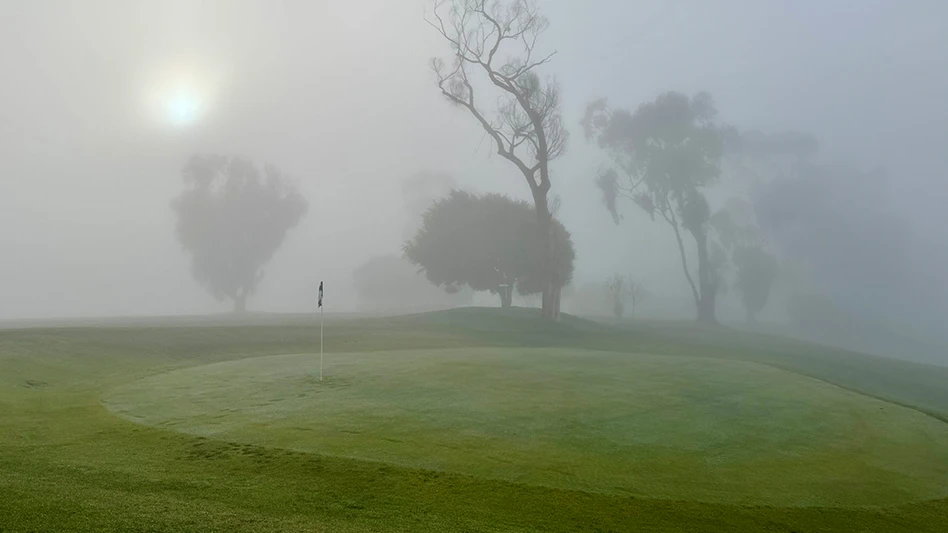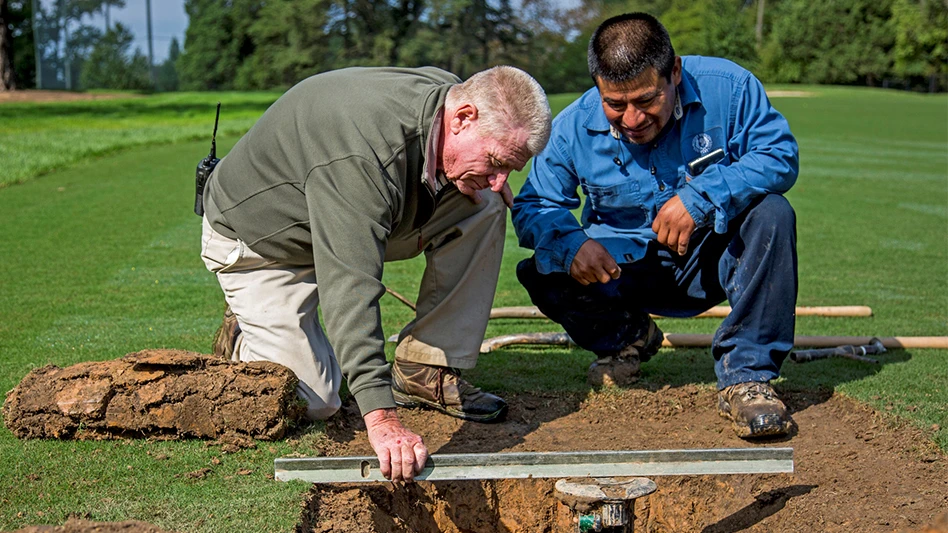 Bill Rose started a name for himself in the seed market when he founded Roselawn Seed 53 years ago. Today, he and the Rose crew continue their tradition with the launch of Pure Seed. Bill Rose started a name for himself in the seed market when he founded Roselawn Seed 53 years ago. Today, he and the Rose crew continue their tradition with the launch of Pure Seed. |
The turfgrass seed business is a strange and mysterious thing to outsiders. It would seem to be simple: you grow it, you price it based on supply and demand and you sell it. Instead, it's a complex chain involving corn and wheat prices, market trends in overseeding and renovation, genetic engineering, plant patents and, of course, weather.
That's why after 25 years of observing the endlessly volatile seed business, I have concluded that the only predictable thing about it is that Bill Rose will always be right at the heart of it.
Rose, now 81, started from humble beginnings as a farmer when he founded Roselawn Seed 53 years ago. (His previous career had been interesting: he was an officer and pilot for the Air Force Strategic Air Command in the 1950s. You know, back when we seriously thought the Russians might nuke us and we might have to nuke them back, Bill was sitting in the cockpit of a big plane carrying those bombs. I kid you not.)
In 1970, Rose started Turf-Seed, Inc., and later its sister company Pure-Seed Testing, to provide reliable, high-quality seed to golf courses and other professional customers. He drove the formation of the Penncross Bentgrass Association with other growers to bring the Penn State varieties developed by Dr. Joe Duich and other researchers to the market under the now famous Tee-2-Green brand name.
 Golf boomed… and so did Rose's companies and the use of their bentgrasses and other varieties around the world. For several decades, Penncross was synonymous with cool-season putting greens.
Golf boomed… and so did Rose's companies and the use of their bentgrasses and other varieties around the world. For several decades, Penncross was synonymous with cool-season putting greens.
The bentgrass market matured, more varieties from more companies emerged and the golf boom slowed to a crawl. Yet, the Turf-Seed name and products still commanded enough of the market to attract the attention of the ginormous Scotts Company. In 2005, Rose and his family sold Turf-Seed, Inc., and its varieties to Scotts. Rose focused his energies on Tee-2-Green and the forage business of Rose Agri-Seed, but it looked like the sunset of his long and illustrious career was nearing.
But, as ESPN's Lee Corso is fond of saying: Not so fast, my friend.
Rumors began swirling in mid-2011 that Scotts was ready to get out of the professional seed business and that Rose and his family were interested in reacquiring many of the Turf Seed varieties.
GCI recently learned that those rumors were true. The family has now launched a new company, simply called Pure Seed, to re-enter the seed sales market. In mid-December, I lined up an exclusive with my old friend Bill – the Lion in Winter of the seed business – and his very savvy daughter Crystal Rose Fricker, an accomplished breeder in her own right who will actually lead the new company as president.
What made you decide to re-acquire these varieties?
Bill: That's a pretty easy question…because the market needs it. They need us. Lots of our (former) distributors have wondered where they'd get the seed in the future given the changes in the market so we felt a responsibility to get back into the business of supplying them and their customers.
Crystal: It's also a matter of wanting to take care of our original varieties in the professional turf market and continue to supply them. We wanted to reconnect to our old friends in the industry and take care of these varieties. It's hard to develop them and nurture them and not be able to sell and steward them in the market.
Explain how you'll operate differently with the formation of the new company, Pure Seed.
Crystal: We're a really integrated company now. We have the research company, Pure-Seed Testing to develop new varieties, the marketing, seed coating and packaging business, Pure Seed and Roselawn Seed to grow production. The new company gives us an avenue to get into the marketplace. This makes us a unique company because we can develop varieties, produce good quality seed, handle seed coating, blending and packaging – all aspects of the turfgrass industry – to bring our products to market the way it should be done.
We're now able to be a fully integrated, one-stop shop for the professional business. It's through a lot of Dad's vision that we're here today.
 Bill, what did you miss most about selling into the golf/turf market the past six or seven years?
Bill, what did you miss most about selling into the golf/turf market the past six or seven years?
Bill: What I really missed were the field days we always held in North Carolina and Oregon. We got to see and visit with customers from around the U.S. and overseas and I always loved that. Everyone had a chance to see the seed, the varieties… the total picture.
So you're bringing back the famous field days?
Bill: Absolutely. The first one will be at the end of June in Oregon.
I'll be there!
Bill: You damn well better be!
Which varieties are you most excited about?
Crystal: We have 23 commercially named varieties and several experimental, so we're excited about all of them. Probably the most notable are (ryegrasses) Brightstar SLT, Silver Dollar, Citation Fore, Tar Heel 2, Dynamic 2, Gazelle 2 and our bluegrasses – Jump Start, Moonlight SLT, Right, and North Star (a top European variety). We also have a new seashore paspalum and some really good, drought-tolerant and glyphosate-tolerant experimentals.
Will you continue to pursue the Roundup-Ready concept for varieties?
Crystal: We're not trying to produce transgenic species, just breeding for natural tolerance to glyphosate and other herbicides.
Bill: I'm excited about the (tolerant) ryegrasses. They'll be tremendous for overseeding and then doing a clean-up with an application of glyphosate.
We've heard that ryegrass prices will be up substantially next year. What are you telling distributors and superintendents about pricing?
Bill: Get your orders in! (Laughs) We don't know yet about production but early orders are going to be beneficial to customers.
Crystal: We did a pretty good job of getting perennial rye out for production, but we don't have huge quantities right now. It's extremely important for folks to order now so we can get correct production in fields. Pricing will be strong simply because it's going to be hard to get our varieties.
How will Pure Seed be structured and explain to me for the umpteenth time how Tee-2-Green fits into the equation?
Crystal: The Pure Seed board includes me as president, Bill as vice president and then Ed Rose (Bill's son who runs Roselawn) and Cara Rose Tuggle (Bill's other daughter). Obviously, we'll work closely with Pure-Seed Testing, Roselawn and Tee-2-Green to take advantage of being as integrated as we can be.
Bill: The distinction is that Tee-2-Green markets the bentgrass varieties. Pure Seed is a distributor for Tee-2-Green and production done by the Penncross Bentgrass Association.
 On top of Pure Seed and Roselawn Seed for production, Pure Seed Testing works to develop new varieties. On top of Pure Seed and Roselawn Seed for production, Pure Seed Testing works to develop new varieties. |
Has it been hard to re-establish local distribution and your supply chain after a six-year absence from the market?
Crystal: We've been lucky on that. We got a really nice welcome back from a lot of our old friends. Russ Hayworth is our sales manager and he had continued selling forage grasses (during our absence from the professional market) and worked for Turf-Seed before, so he has the contacts. Lew Sharp, who also works for Tee-2-Green, is also in the field talking to distributors and customers. Plus, I've been on the phone and dad's been on the phone. I also went to China recently to figure out their needs over there.
Bill: I'm really looking forward to the golf course show (GIS) this year. That'll be our chance to get face to face again.
What's the best way for customers to get in touch until all of those deals are finalized?
Bill: Our new website will be up soon. In the meantime call us (503-651-2130) and ask for Russ Hayworth or Lucas Solis, our strategy manager.
Given the crazy state of the seed market, what challenges do you face?
Crystal: Plenty, but I'm not really worried because people know us and our varieties. They want the products we have. The real challenge is how much to produce and finding quality growers to do it for us. It usually takes a couple of years to really get production running.
Bill: Other companies like Jacklin have made real inroads (in our absence). We'll have to counteract that. Also, we need to be strong in China and Korea. Lew Sharp is over there a lot and he has the power to spec our varieties, work with architects and such. It's really important that we work with architects over there to get them on board with us.
Crystal: We have to differentiate our products from the competition. The cool thing is that we've continued our research into varieties and traits. We're not behind on that. We have lots of exciting varieties coming with disease resistance, drought tolerance and other characteristics superintendents are looking for.
 You're raring to go to get back in this business, aren't you?
You're raring to go to get back in this business, aren't you?
Bill: I'll say. I missed it a lot. I missed the sod growers. I missed working on overseeding with the folks in Palm Springs – it all started at La Quinta Country Club down there you know. We really are looking forward to getting re-engaged. The biggest thing about this is that we get to reconnect directly into the market. That's going to be fun!
Crystal: I'm looking forward to being a little more in control and being able to serve the customers quickly and with integrity and high quality products. And to use their feedback to improve our products too. Like Dad said, it will be more of a direct connection to a market we really love.
Bill: We want to reconnect. We couldn't do the job we knew needed to be done. We have an opportunity to start over. It's been five years and things move fast – there are new problems and challenges for superintendents – but we think we're ready.
So Bill…old friend…will you ever actually retire?
Bill: I don't intend to retire! Not until I check out for good. I just got my plane back (after a crash two years ago) and I'm getting checked out again to start flying. I'm having too much fun to retire.
Pat Jones is GCI's publisher and editorial director.

Explore the January 2012 Issue
Check out more from this issue and find your next story to read.
Latest from Golf Course Industry
- Beyond the Page 65: New faces on the back page
- From the publisher’s pen: New? No way!
- Indiana course upgrades range with synthetic ‘bunkers’
- Monterey Peninsula CC Shore Course renovation almost finished
- KemperSports and Touchstone Golf announce partnership
- PBI-Gordon Company hires marketing manager Jared Hoyle
- Mountain Sky Guest Ranch announces bunker enhancement project
- GCSAA names Joshua Tapp director of environmental programs






